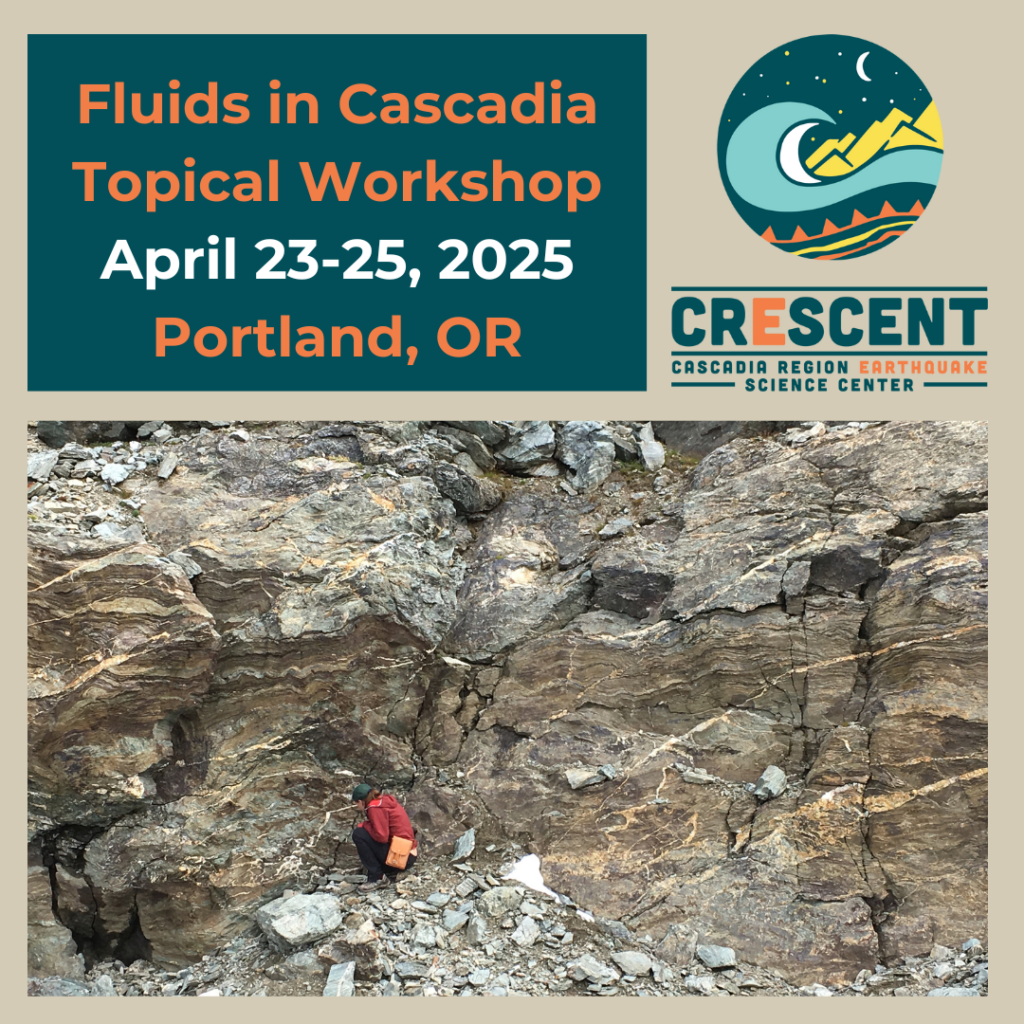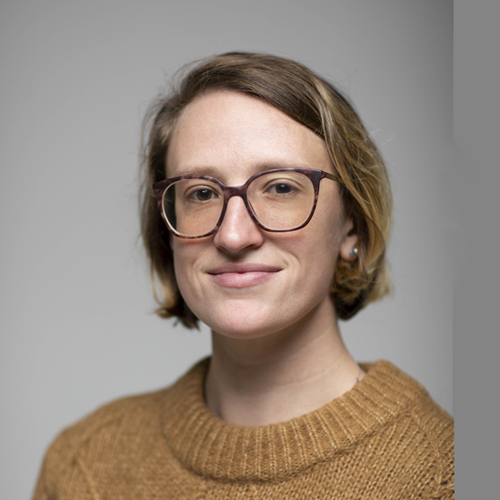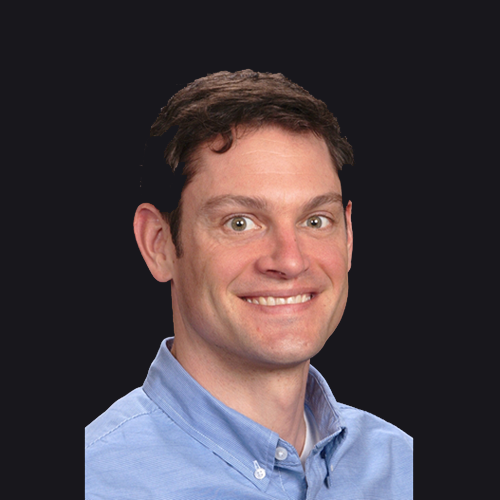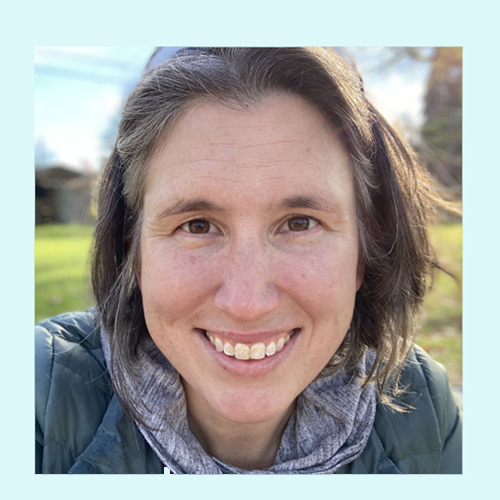
CRESCENT Topical Workshop
Fluids in Cascadia
April 23-25, 2025
Portland, OR
Workshop Goals

Fluids in Cascadia Topical Workshop
Fluids are ubiquitous in subduction zones and play a fundamental role in modulating many observed processes along the megathrust and other related faults, including slip behaviors and deformation mode. This cross-disciplinary workshop brings together geophysicists, geologists, geochemists, and modelers to discuss the role of fluids in Cascadia.
Workshop topics include fluid sources (hydration of the oceanic slab, thermal and petrologic constraints on dehydration reactions, dewatering of sediments); fluid pathways, fluxes, and transport properties; pore pressure and fault strength; and fault slip/deformation behavior along the megathrust from the deformation front, through the seismogenic zone, and into the regions of slow slip and tremor and creep.

Attendance

This workshop has concluded. Please reach out to cascadiaquakes@uoregon.edu for more information.
Travel & Lodging
Venue
Flights, ground transportation and parking
Lodging
Meeting Information Packet

Contents:
- Full agenda
- Presenter bios
- Poster titles and authors
- Attendee list
Presentation slides – See links in agenda below for available slide decks
Agenda

Wednesday, April 23, 2025
2:00 – 5:00 pm: Introduction to Fluids in Subduction
“Hydrogeology of Subduction Forearcs: Fluids as agents of mechanical and transport processes” presented by Demian Saffer, Director/Professor, Institute for Geophysics – The University of Texas at Austin
“Hydrogeologic Transients and Fault Slip: Clues, Connections, and Open Questions” presented by Patrick Fulton, Assistant Professor, Cornell University
“What can petrology and geochemistry of subduction-related rocks tell us about subduction zone fluids?” presented by Sarah Penniston-Dorland, Professor, University of Maryland
Thursday, April 24, 2025
9:00 – 9:30 am: Opening remarks
9:30 – 10:30 am: Session 1 – Initial Fluid State of Subducting Material
“Tracing inputs into subduction zones using forearc spring geochemistry” presented by Jaime Barnes, Professor, The University of Texas at Austin
“Initial hydration state of subducting crust, lessons from Hikurangi” presented by Andrew Gase, Assistant Professor, Boise State University
11:00 am – 12:30 pm: Session 2 – Plate Boundary Fluid Evolution
“Temporal evolution of fluid-driven processes along convergent margins: insights from petrologic and time dependent thermal models” presented by Gabe Epstein, Postdoctoral Fellow, University of Miami
“Developing a shallow thermal structure model for the Cascadia Subduction System” presented by Magali Billen, Professor, University of California – Davis
“Can we detect changes in the fluid network near the slab interface during the ETS cycle by continuous magnetotelluric monitoring?” presented by Adam Schultz, Professor, Oregon State University
1:30 – 2:30 pm: Lunch
1:30 – 2:30 pm: Session 3 – Shallow Fluids Updip of the Seismogenic Zone
“Mechanisms generating fluid overpressure at the trench of subduction zones and implications for megathrust weakening” presented by Maria Nikolinakou, Research Professor, The University of Texas at Austin
“State and Evolution of Fluid Pressure Above the Shallow Cascadia Megathrust: Insights from Observations and Models” presented by Tianhaozhe Sun, Research Scientist, Geological Survey of Canada
2:30 – 4:30 pm: Poster Session
Friday, April 25, 2025
9:00 – 10:30 am: Session 5 – Fluids in the Seismogenic Zone
“Pressure Solution and Fluid Flow in the Seismogenic Zone: Application to Cascadia” presented by Don Fisher, Professor, Penn State University
“Geologic Evidence of Deformation and Fluid Processes in the Seismogenic Zone” presented by Harold Tobin, Professor, University of Washington
“Fluid pressure and frictional-viscous transition in megathrust accounting for dehydration fluid production” presented by So Ozawa, Assistant Professor, University of Tokyo
10:30 am – 12:30 pm: Poster Session
1:30 – 2:30 pm: Lunch
1:30 – 2:30 pm: Session 7 – Fluids and Slow Slip: Geology and Experiments
“Transient permeability of a deep-seated subduction interface shear zone” presented by Jesus Munoz-Montecinos, Postdoctoral Researcher, ETH Zürich
“Experimental constraints on fluid transport and deformation at seismogenic depths” presented by Tamara Jeppson, Research Geophysicist, United States Geological Survey
2:30-3:30 pm: Session 8 – Fluids and Slow Slip: Geophysical Constraints
“The seismic consequences of being a leaky fault” presented by Gaspard Farge, Postdoc, University of California – Santa Cruz
“The relationship between interseismic locking, slow slip, and afterslip at subduction zones and implications for the role of fluids in faulting.” presented by Kaj Johnson, Professor, Indiana University
3:30 – 4:00 pm: Session 9 – Vision for the Future
Workshop Planning Committee

CRESCENT’s Cascadia Subduction Fluids Special Interest Group leaders bring expertise and connections from across the spectrum of engineering, research, and practice to guide the planning process.

Cailey Condit
University of Oregon
ccondit@uw.edu

Eric Dunham
Stanford University
edunham@stanford.edu

Amanda Thomas
University of Oregon
amt.seismo@gmail.com
